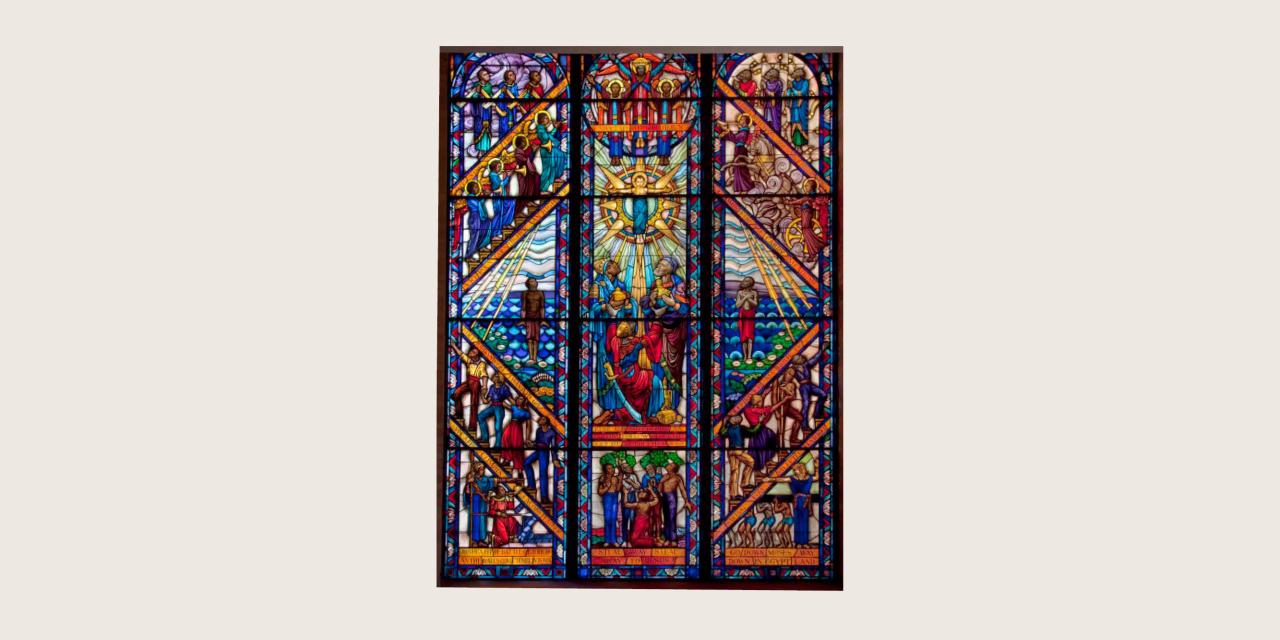Demetrius K. Williams is a scholar who comes from a long line of Black Baptist ministers. Williams has taught comparative literature, global studies, and theology at universities and theological schools in Milwaukee, Wisconsin; Atlanta, Georgia; and New Orleans, Louisiana. He has pastored Community Baptist Church of Greater Milwaukee since 2009. His most recent book is The Cross of Christ in African American Christian Religious Experience: Piety, Politics, and Protest (Lexington Books, 2023). In this edited conversation, he discusses what Christians miss when they think Paul talked about the cross only in terms of personal atonement.
Why did you write The Cross of Christ in African American Christian Religious Experience?
I wrote The Cross of Christ to lift up and tease out some overlooked and under investigated aspects of the cross. These aspects have been muted and distorted to advance and rationalize human enslavement and empire building in Western colonial ventures in sub-Saharan Africa and the New World. For this reason, I sought to explain that the cross of Christ, as Martin Luther King Jr. stated, “is the power of God unto social and individual salvation.” I’d add to that the power of God for social transformation.
My audience is general, academic, and ecclesial (churchly). I hope a general audience will find The Cross of Christ informative and enlightening. As an academic, I hope my book will critically and creatively advance the untapped potential of research and rhetorical analysis of cross terminology in Paul. As a pastor, I hope to inform the church in general—and the Black church in particular—about how the full power of the cross of Christ can advance how the church participates in and quests for a more just and equitable world. This book reflects a story about the cross of Christ as told from African Americans’ religious, historical, and cultural perspectives.
What do most Christians know about how Paul explains the power of the cross of Christ?
Christian tradition has long acknowledged that Paul spoke about the theological meaning of Jesus’ death on the cross. I grew up with the image of Christ on the cross and the promise that he died for my sins. When Paul wanted to explain the meaning of Christ’s death and its effects for human redemption and atonement, he tended to speak about Christ’s death “for us and on our behalf.” In Romans 5:8, Paul wrote, “But God demonstrates his own love for us in this: While we were still sinners, Christ died for us” (NIV). Galatians 1:4a notes that Christ “gave himself for our sins to rescue us from the present evil age” (NIV).
And what untapped potential do Christians often miss about the power of the cross of Christ?
Seeing the cross as only about atonement has blinded many Christians to how Paul argued, talked, and challenged fellow believers. Paul used a rhetorical terminology of the cross to explain its power as not only atonement for personal, individual sin but also for unity and equality in Christ. Researching and writing my dissertation opened to me that Paul sometimes talked about the cross in “fighting” and “argumentative” language. He used this cross discourse and ideology when someone challenged his apostolic identity or when he addressed conflict in his communities between Jesus-believing Jews and Gentile believers of different ethnic groups and national origins.
In 1 Corinthians 1:18, Paul writes, “For the message [discourse] of the cross is foolishness to those who are perishing, but to us who are being saved it is the power of God” (NIV). Paul argues against Jewish believers who say that Gentile believers must be circumcised. “For, as I have often told you before and now tell you again even with tears, many live as enemies of the cross of Christ” (Phil. 3:18, NIV).
Why did Paul preach so often about the power of the cross to create one body in Christ?
Paul’s driving question was how to address socio-religious injustice among Jewish and Gentile believers so they would see themselves as equal members in the newly constituted people of God. He used cross terminology to intervene with practical solutions when Christian communities tried to make one group’s ethnoreligious identity or identity symbols the dominant template for belonging. Paul preached that a full understanding of the power of cross must change communal relations: “There is no longer Jew or Greek; there is no longer slave or free; there no longer male and female; for all of you are one in Christ Jesus” (Gal. 3:28).
How did this “one body” message affect the African American Christian experience?
It helped African American Christians in at least four ways. First, the cross of Christ that has been preached in our churches and celebrated at the Lord’s Supper supplied spiritual strength during the dark days of slavery, segregation, and discrimination in America. It still powerfully inspires people to protest and challenge unjust systems that have marginalized Black people. Second, the cross of Christ historically provided a sense of value and personhood—“somebodiness”—to enslaved and newly freed persons. It assured them that they mattered to God. God loved them and sent Jesus Christ to die and atone for them as well as for all other humans.
Third, in a world where Black people were devalued and dehumanized, Paul’s cross discourse affirmed that they are indeed part of the human family. They deserve dignity and humane treatment because Christ died for all. Finally, African American preachers have perceived the cross of Christ as an authoritative and commanding symbol. It is a source for addressing racial inequity in America and supplies a vision for realizing true and democratic principles of enlightened society. Black preachers defined Christianity as not so much about adherence to certain creeds, but by how much an individual or group sought to reconcile difference among the races.
Black preachers defined Christianity as not so much about adherence to certain creeds, but by how much an individual or group sought to reconcile difference among the races.
How have Christians misused the language of the cross to preserve inequality?
During the Crusades, popes and rulers endorsed holy war against infidels as a way to spread the faith for which Christ our God shed his blood. Likewise, fifteenth-century European rulers spiritualized the significance of Christ’s crucifixion as they “discovered,” enslaved, and colonized people in other continents.
Prince Henry of Portugal (1394–1460) rationalized that sub-Saharan Africans were better off after enslavement because Christ died to save lost souls, and they could now look to the reward of heaven. Henry, his biographer, and several popes said that enslaving non-Christian peoples and devaluing and mistreating their bodies was a way to increase faith in Christ. They said that Christ became flesh, died, and rose again for one purpose only: to seek and save lost souls.
Did the Reformation change how preachers explained the power of the Christ?
Paul often explained that saying “Jesus is Lord” means that Caesar is not. Roman imperial ideology revered the emperor as a cosmic peacemaker. Caesar was seen as the chief priest, savior, lord, and “son of God” divinely chosen to unify all people and guarantee peace and security on earth. Paul preached that Jesus, who was crucified by Roman power, is the true reigning ruler and Lord. The crucified Christ is the basis and subject of the gospel of God. Only Christ has the power to bring about peace, human unity, and the universal salvation of all humankind.
Well before the Reformation, Western European Christians had reshaped the meaning of Christ’s cross for the prerogatives of empire. The Reformation did not change the alliance between church and state. As German Protestant theologian Helmut Gollwitzer explained, the Reformation yielded theological developments like justification by faith and not works, the believer’s freedom in Christ, and believer’s baptism upon confession and repentance. But it did not change how white people treated people of color throughout the world.
How did white preachers preach the gospel to enslavers and the enslaved?
When enslavement was legal in the United States, prominent missionaries and pastors often enslaved people. Some plantation owners denied that Black or Indigenous people were full human beings with souls. Others worried that conversion and baptism might make enslaved people feel entitled to freedom. Religious leaders responded that Christ died on the cross to save them from their sins spiritually so they might fulfill their “duty” as slaves to whites physically.
Presbyterian minister and missionary Charles Colcock Jones explained it was possible to carefully and cautiously instruct the enslaved so that saving their souls would in no way interfere with their civil condition or threaten the slavocracy based on exploiting Black bodies. The so-called Slave Bible, which removed about 90 percent of the Old Testament and half of the New Testament, was a tool to help converts focus on a gospel of obedience, not liberation.
After emancipation, how did Black Christians advocate for the gospel’s power to transform society?
I researched many original sources for this book. I love how a 1917 Atlanta Independent article reprinted in the National Baptist Union-Review equated both spiritual equality and social justice as essential elements of the gospel of Jesus Christ. When evangelist Billy Sunday announced a visit to Atlanta, Georgia, the article suggested that if Billy Sunday “is sincere and is a lover of God and humanity, he has a splendid opportunity to preach the Fatherhood of God and the brotherhood of man.”
The article explained that besides denouncing adulterers, fornicators, liars, hypocrites, “bums,” and hoboes, Sunday should also address “the lyncher, the ballot box thief, the segregator, the discriminator, the Negro hater, the promoter of racial strife and the mob leader who burns human beings at the stake because they are black.”
Why do some Christians still see the call for social justice as peripheral to the gospel?
Paul spoke often about how Christ, through suffering and dying on the cross, broke down the walls between Jew and Gentile (Eph. 2:11–14). Taking on the mind of Christ means emptying ourselves (Phil. 2:5–11) of ethnic-racial heritage, privilege, and status to join the one body of Christ. For Paul, the cross of Christ is the only foundation upon which to build the universal identity of the Christian community (1 Cor. 3:11–15).
Many prominent American Christians, however, see social justice as a distraction from the gospel. The 2018 Statement on Social Justice, also known as the Dallas Statement, declares in its Article 6 that the gospel is only about being saved from personal sin. Statement commentators say that Jesus’ Second Great Commandment, to love others as ourselves, is an instance of the law, not a defining feature of the gospel.
That view is a consequence of recognizing only the theology of the cross. It fails to see how Paul’s cross terminology and ideology reveal the full power of the gospel. Christ, in whom all things were created and all things hold together, came to “reconcile to himself all things, whether things on earth or things in heaven, by making peace through his blood, shed on the cross” (Col. 1:15–20, NIV).
Learn More
Read The Cross of Christ in African American Christian Religious Experience: Piety, Politics, and Protest, by Demetrius K. Williams (Lexington Books, 2023). Find more stories of how Black Christians have kept the faith in The Spirit of Justice: True Stories of Faith, Race, and Resistance, by Jemar Tisby.

